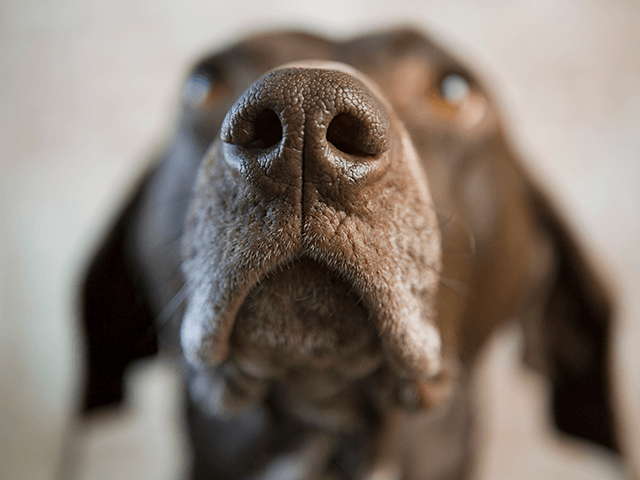A new German-led study shows for the first time sniffer dogs can distinguish “Covid-19,” or Chinese coronavirus, from other 15 other viral pathogens, the German news agency Deutsche Presse-Agentur (DPA) reported Tuesday.
“Sniffer dogs are able to distinguish the Sars-CoV-2 coronavirus from 15 other viral respiratory pathogens with high accuracy,” DPA reported on November 23, citing the new study.
“Sniffer dogs do not smell the virus itself, but volatile organic compounds that are produced during metabolic processes after a virus infection,” DPA noted of the study’s findings.
An international team of researchers spearheaded by the German University of Veterinary Medicine Hanover conducted the study, which was published online on November 18 by Frontiers in Medicine, a peer-reviewed open-access medical journal.
“In all three test scenarios, the mean specificities were above 90 percent which indicates that dogs can distinguish SARS-CoV-2-infections from other viral infections,” according to the report.
“Covid-19,” or the Chinese coronavirus, is the name of the disease caused by SARS-CoV-2, a type of coronavirus.
Several studies over the past year and a half established that trained scent detection dogs were capable of distinguishing coronavirus-infected persons from those without the virus, often with high accuracy.
The authors of the latest study out of Germany note that its findings demonstrate, for the first time, “canines … [can] distinguish between SARS-CoV-2-infections and infections caused by different human coronaviruses … [and] other viruses that cause similar symptoms like influenza virus, parainfluenza virus or human rhinovirus.”
“In the current study, dogs were able to discriminate samples from SARS-CoV-2 infected individuals and cell cultures from those infected with one of 15 other common acute respiratory viruses as distractors,” the study found.
“The canines’ accuracy rivals traditional coronavirus tests and even some lab equipment,” Kenneth G. Furton, a professor of chemistry and biochemistry at Florida International University (FIU), told the Washington Post on September 9.
Furton cited a “double-blind study published by FIU, which found the animals achieved 96 to 99 percent accuracy rates for detecting the virus.”
Miami International Airport recently became the first U.S. airport to use trained dogs to detect coronavirus. The airport launched a pilot program in August to use sniffer dogs to screen airport and airline employees at their entry checkpoints for coronavirus, according to the Post. The pilot will eventually expand to “include travelers and not just employees” of Miami International Airport, Furton predicted in September.
“If deployed more widely to sniff out passengers, the dogs may also deter would-be travelers inclined to fib about their coronavirus exposure or infection status,” the Post noted.

COMMENTS
Please let us know if you're having issues with commenting.